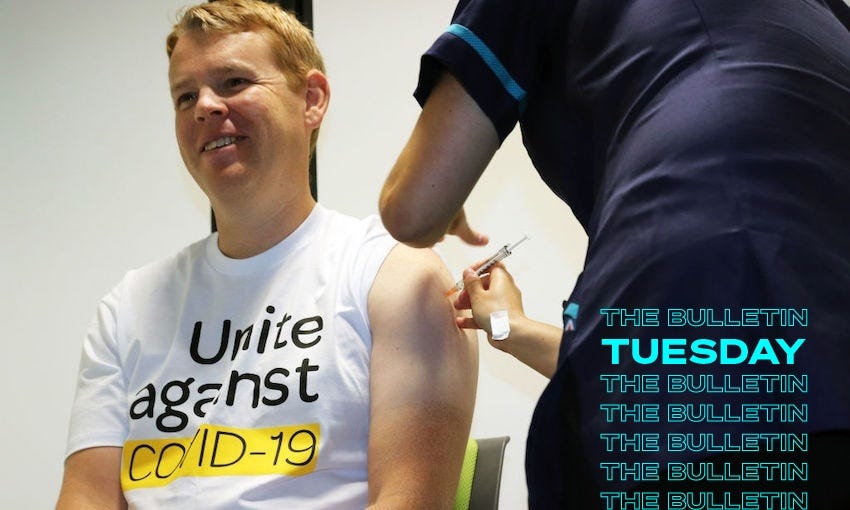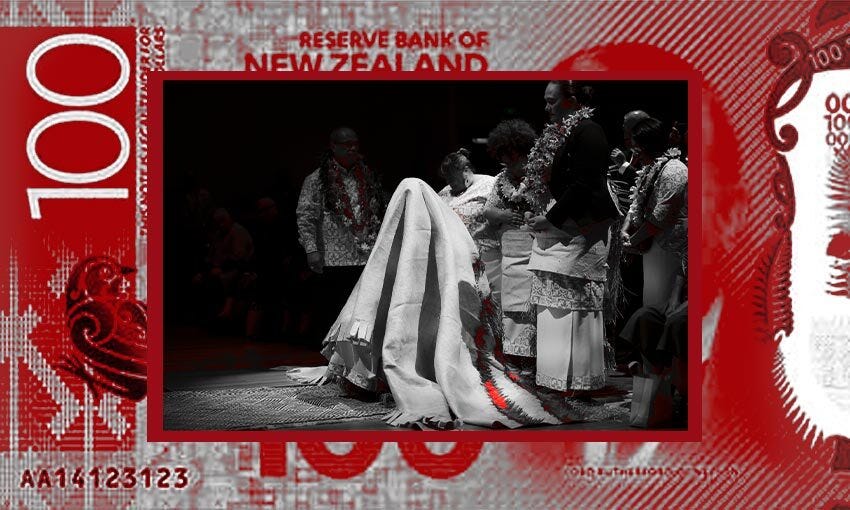Boosters from end of November
Fully vaccinated New Zealanders over the age of 18 will be able to get a booster six months after their second dose of the Pfizer jab
Mōrena and welcome to The Bulletin for Tuesday, November 16, by Justin Giovannetti. Presented in partnership with Z Energy.
In today’s edition: Call to better manage self-isolation; vaccine mandates take effect in health and education; the Cop26 summit reviewed; but first, boosters.
Covid-19 minister Chris Hipkins will be eligible for a booster on November 29. He got his first dose nearly eight months ago. (Lynn Grieveson/Newsroom via Getty Images)
The boosters are coming. New Zealanders will begin getting third doses of the Pfizer Covid-19 vaccine from the end of November, Stuff reports. The booster will be available to anyone aged 18 and over who received their first two doses at least six months earlier. Healthcare and border workers will likely be first in line for a booster, many having received their first doses near the start of the year. While a third primary dose was approved in October for severely immunocompromised people, a third dose as a booster will be available for everyone. Nearly 456,000 New Zealanders will be eligible for the extra dose by the end of the year, with millions more to follow in 2022.
The argument about third doses. There’s been a debate for much of 2021 about whether booster shots should be a priority. Both the European Union and World Health Organisation have voiced concerns about giving third doses in rich countries while billions around the world have yet to have a first dose. The Lancet has looked at the debate. One finding is that manufacturers are now producing 1.5 billion doses monthly, so the global population could (or at least should) be quickly immunised.
New Zealand has now come out strongly in favour of boosters, with prime minister Jacinda Ardern saying yesterday that “boosters are a belt and braces approach,” not a nice to have. Preliminary trials have shown that while the Pfizer jab’s effectiveness wanes over time, a booster shot brings it back up to 95.6%, according to the Financial Times.
When should you go for a booster? Because the Pfizer jab continues to protect people even after six months, the government says there will be “no rush” to get a booster immediately when you’re eligible. With most New Zealanders likely to get a booster next year, it’s probably best to wait before booking. The country’s Covid-19 situation is likely to look very different by then. As The Atlantic writes, boosters should be timed to coincide with when you’re most likely to be exposed to the virus. “The dynamics of transmission in your area may be more important than the details of your personal vaccine schedule,” according to the magazine.
If you haven’t had your first vaccine, there’s still time to be protected by Christmas. One News did the maths and people have until this Friday to get their first dose if they want to be fully vaccinated by Christmas. It’s also likely the country will be in the traffic light system at that point, which has serious restrictions on the unvaccinated. It could mean a much safer holiday for many, with the chance of infection reduced by 200 times if two people interacting are fully vaccinated.
Waikato moves into level two at midnight tonight.
If you like what you’re reading, we need your support. The Spinoff is doing our utmost to keep you updated on Covid-19 related news. Every dollar our members contribute directly funds our editorial team and is devoted to ensuring we do more. Click here to learn how you can support the team today.
Health watchdog tells ministry to pay ‘urgent attention’ to self-isolating Covid cases. Toby Manhire reports in The Spinoff that the health and disability commissioner has written to the health ministry after concerns have been raised that people isolating at home aren’t getting enough care. Three deaths have been reported in the past fortnight and people self-isolating have reported not getting enough attention or oxygen monitoring equipment. The health minister admitted last week that the country’s nurses and doctors were struggling to manage the thousands of Covid-19 cases now isolating at home.
The Covid numbers: There are 90 cases in hospital and 7 in ICU/HDU. There are now 3,629 active cases in New Zealand. 163 new community cases were reported in Auckland yesterday, 7 in Waikato, 2 in Northland and 1 in Taupō. 14,638 people were vaccinated on Sunday.
The Spinoff’s Covid data tracker has the latest figures.
Vaccine mandates for educators and health take effect today. Unvaccinated teachers and workers in early childcare were given farewells yesterday as they are no longer allowed on school grounds, the NZ Herald reports. No school has reported being unable to operate because of losing staff and only 11 told the government that they were at high risk of seeing teachers leave. Doctors and other workers in the health sector also face a similar deadline and about 2,000 haven’t been vaccinated, according to RNZ. Health, disability and education workers who have received only one dose have until January 1 to be fully vaccinated or they will also be barred from their workplaces.
The Cop26 summit was ‘least worst’ outcome: James Shaw. The climate minister has said an imperfect decision in Glasgow was better than none at all, RNZ reports. As reported in yesterday’s newsletter, the summit left environmentalists unhappy with an agreement that many felt didn’t go far enough. Language to phase out coal was weakened at the last minute, undermining what could have been a significant achievement.
Hours after the agreement, Australia’s prime minister stood in front of a train loaded with coal and told coal miners that they’ve got guaranteed work for decades to come. According to ABC, he said a transition away from coal “isn’t happening”. He’s electioneering, but that’s some eyebrow raising rhetoric.
A battle over one of the world’s largest marine reserves. One News reports that the Kiribati government’s plan to ditch the Phoenix islands protected area, a 400,000 square kilometre World Heritage Site, is being opposed by the local environment minister. The country’s cabinet voted to open the reserve to commercial fishing and end its protected status, something the minister says was done without consultation. The country is closely allied with China and there are concerns Beijing pressured it to allow fishing, along with plans to build a runway in the middle of the area that could be for military purposes.
Got some feedback about The Bulletin, or anything in the news?
Get in touch with me at thebulletin@thespinoff.co.nz
Right now on The Spinoff: Madeleine Chapman wonders if the government’s Dawn Raids fund is an act of reconciliation or an empty political gesture. Mirjam Guesgen looks at why groups around the world are trying to put a price on climate change. Becky Carruthers writes that while the pandemic and Covid vaccine are new, mandates aren’t. Duncan Greive speaks with Three's new CEO about the direction the company is taking into reality TV and new channels. Charlotte Muru-Lanning asks if the extravagant prices for iced coffee can be justified as we head into warmer days.
The high cost of Covid zero. New Zealand has abandoned the elimination strategy and the government is set to unveil plans tomorrow for moving beyond lockdowns in a vaccinated future. With strict quarantine, closed borders and intensive contact tracing, Taiwan and New Zealand look similar. However as New Zealand battles an outbreak and prepares to reopen to the world, The Guardian reports that Taiwan is sticking with its version of elimination and locals question how long Covid zero can last in a delta world. There’s currently no domestic outbreak in Taiwan. While the government in Taipei has said it will consider relaxing restrictions once vaccination levels are high enough, businesses and tourism operators say they need certainty. It all sounds very familiar.
What went wrong with the T20 final. Dylan Cleaver writes in The Spinoff about everything that didn’t go according to plan in yesterday’s Twenty20 World Cup final and the few things that did. Kane Williamson was an unexpected bright spot for the team after a year of struggling with injury, much of the rest didn't go well. Don’t blame the format, the Black Caps remain an excellent team and one loss doesn’t change that.
That's it for The Bulletin. If you want to support the work we do at The Spinoff, please check out our membership programme.







